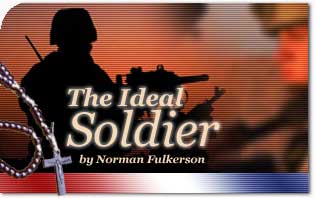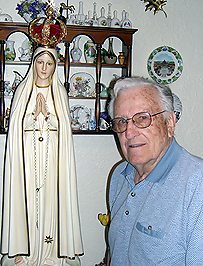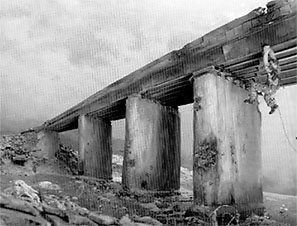
It is not every day that one meets a veteran of World War II much less one who was present during the historic battle for Iwo Jima. But I knew something was different about Norbert Arnold as he approached me during a presentation about Fatima at his cousin’s home in St. Mary’s, Pennsylvania.
He appreciated the chance to venerate the large pilgrim statue of Our Lady of Fatima that day. “Looking at her mantle” he said, “brought back a lot of memories.”
There was a reason for this.
He is the son of German immigrants and was blessed to have a pious mother who gave him very valuable advice before he left for war. “Ask Our Lady,” she said, “to surround you with her mantle.”

Being a good son, Mr. Arnold did as his mother asked. As he faced the many trials of war, he often reminded Our Lady to do just that. This was made much easier by the fact that he always carried a small leather pouch which contained not only his rosary but also miniature statues of Saint Joseph and Our Lady.
Miraculous Assistance
Towards the end of the war, he and his fellow soldiers were low on everything including food and water. Mr. Arnold decided to leave the safety of his foxhole to obtain supplies for his men from the headquarters a short distance away.
Upon leaving headquarters with his supplies, an officer yelled out: “Arnold, you forgot your water.” Already weighted down, he decided to leave the water for a return trip. While walking to his foxhole, a can of pineapple fell out of his jacket. When he returned to get the water he had left behind, he tripped on the can. Instead of continuing on to headquarters which would have been the most logical thing to do, he decided to take it back to the fox hole.
A moment later, the headquarters received a direct hit from a shell which killed everyone. The explosion sent shrapnel flying in all directions. One three-inch piece went spinning through the air until it hit, and tore into Mr. Arnold’s jacket.
“If it would have hit me in the face,” he recounted, “it would have killed me.” Upon further examination he found that the shrapnel did considerable damage to his jacket but left him perfectly unscathed.
He later attributed this to Our Lady and remembered what his mother had told him.
The Breaking of a Myth
As I looked into the eyes of this 84-year-old marine, I could not help but admire him as he recalled these miraculous events with such unpretentiousness. Here was a man that truly represented the ideal soldier. He not only answered the call of duty to his country but remained a man of faith conserving that which is most important to a Catholic: a love of God and devotion to Mary Most Holy.
Men with faith such as this often go unnoticed. The current trend is to portray American soldiers as mere beasts who take delight in bringing pain and suffering to those they combat. This negative image was only enhanced with the lamentable episodes at Abu Ghraib, about which the mainstream press gave more than ample coverage. Photos of flag draped coffins and sordid stories of prisoner abuse, generously provided by the media, depict America as an “imperialistic” country only concerned with flexing her muscle in the conquest of weaker nations. This is the last place one would expect to find anything closely resembling the ideal soldier.
However, the ideal American soldier can be found wherever Americans have serviced. A few facts from our military history prove this.
“I’ll Say a Mass Beneath It”
This year marks the 60th Anniversary of the battle at Iwo Jima and there are few Americans who have not seen the famous sculpture which immortalized that battle. Everyone knows about the flag raising, but few know about the Catholic Mass celebrated immediately afterwards. This fact was related in the book, Battlefield Chaplains Catholic Priests in World War II, by Donald F. Crosby, S.J.1
He narrates how anxious marines, as they approached Mount Suribachi, quipped: “Wouldn’t it be nice to plant the flag on top!” None of them balked when Fr. Charles Suver suggested something even better. “You get it up there,” he said, “and I’ll say Mass under it.”
Days later he kept his promise. As curious Japanese popped their heads from cavernous hideouts, seasoned American soldiers, with rifles locked and loaded, united their sufferings with those of Our Lord in the unbloody renewal of the sacrifice of Calvary on the summit of Mount Suribachi.
Father Crosby relates many similar stories where soldiers, entrenched in battle, practiced their faith, requesting confession and communion. In one such incident, a group of soldiers in a foxhole were killed from a direct hit only hours after receiving sacramental absolution from the Church.
Devotion in Vietnam
Similar examples were also found in the Vietnam War. They provide a clear contrast to the fabricated image of Vietnam veterans as drug-abusing baby-killers.
Sam Gallaher was there and as a personal friend often told me stories of his adventures. He is never so eloquent as when he speaks of the consolation he received from the sacraments of the Church.
“Every six days we would have mass,” he explained. The soldiers would construct the altar themselves by stacking their ruck sacks on top of each other. “You would look forward to it because it was the time you could escape [the war]” he said. “I never attended mass, like I did when I was in Nam.”
He did his duty, stayed close to God and, in spite of his 6 feet 8 inch frame which made for an easy target, miraculously survived the war. He, like Mr. Arnold, attributed his safety to Divine Intervention.
Eternal and Natural Law: The Foundation of Morals and Law
Equally impressive are two facts about Col. John Ripley, one of the most decorated living Marines.2He almost single-handedly stopped a North Vietnamese offensive at the village of Dong Ha. He does not fail to credit the intercession of our Lord and His Holy Mother. When he was out of strength, he turned to them. “Jesus, Mary, get me there” was his own improvised version of the rhythmic chants often used by Marines.

While speaking to a TFP audience about this incident he was brought to tears when recalling that among the civilians in the village of Dong Ha he saved, was a school full of innocent children. This tender solicitude for the weak and defenseless was an essential characteristic of the medieval knight but often overlooked when exhibited by an American soldier such as this.
“Ranger Rosaries”
Skeptics will disregard what has been pointed out thus far as examples of “old devotions” and noble attitudes perhaps practiced long ago by a few, but now discarded in favor of a “my-way-or-the-highway” attitude often attributed to the American soldier.
Critics such as these have not heard about what Sgt. Frank Ristaino and his ten children are doing.
Realizing the consolation of the rosary in time of combat, they came up with the unique idea of the Ranger Rosary. The soldier’s rugged and often grueling life was the main consideration for the creation of these Marian military beads. The final product was a rosary made with an almost indestructible parachute cord and the necessary camouflage color for use in the field. These rosaries are now found all over Iraq and other battlefields. It is the type of rosary a soldier can hold in one hand while gripping an M-16 in the other, providing him the means to honor Mary and, at the same time, fight terrorists attacking innocent civilians.
Quotes About the Rosary from Our Lady, Popes, and Saints
What began in Sgt. Ristaino’s living room in the late nineties has grown a lot. With the help of schoolchildren, rosary guilds, and a variety of other Catholic organizations, over 30,000 rosaries have been produced thus far.3
One military chaplain, whose identity was concealed for security purposes, wrote back to express his appreciation:
The soldiers have been briefed on the importance of devotion to Our Lady and we rely on her protection. The battalion has already undertaken to program a trip to Lourdes as soon as we return safely to Germany.
Your rosaries have been a huge hit with everyone. Words cannot express the gratitude we feel for all of the hard work that you and your rosary making team have gone through to support our mission here in Iraq. Though the violence continues unabated, I am sure that things would have been worse had it not been for the constant intercession of Our Lady. Your efforts have helped to increase the devotion to her intercessory powers.4
Not Even Pat Tillman is Spared
Contemporary society is so racked by scandals which consistently place individual gratification above man’s obligations to God. Few would think to look towards our armed forces for examples of the contrary. Their brand of knightly honor is passed over in favor of negative news.
Even Pat Tillman’s unselfish sacrifice was briskly downplayed with the excuse that, “he would not want all the attention.” Much attention would later be given to the fact that his death was the result of friendly fire. (As if that takes away from the sacrifice he made by forgoing a hugely lucrative NFL contract.) His heroic tale is now callously presented as merely a means of the military, “to foster a patriotic response across the country.”5 Patriotism is a virtue and one that becomes much easier to practice when inspired by such examples as this.
Perhaps this was the reason for my enthusiasm when meeting Norbert Arnold. He is an elderly gentleman who has carried with a great degree of dignity something of the ideal American solider as he reaches the end of his life.
Conclusion
Mr. Arnold is now being treated for physical ailments that come with age and the lingering pains of war in the form of post traumatic stress syndrome. Yet he relates all this with an admirable patience and an attitude which can only be defined as supernatural. “When I say my morning prayers,” he said, “I am ashamed to include myself.” Such is the self-sacrificing attitude of a man who is still alive thanks to Our Lady.
On the 60th anniversary of the battle for Iwo Jima, I felt deeply honored to shake the hand of one who had been involved in such a noble endeavor. True soldiers such as he are an image of the medieval knight who accomplishes his duty no matter the hardships. He defends the weak and helpless and does so primarily because of his love of God. These are the qualities of all those mentioned above.
Amidst the barrage of disparaging propaganda belittling the efforts of our men of arms, I believe we should be looking at the ideal American soldier among them. Their dedication and pious devotion is a tale so often untold.
In the modern armies in our secular world, one would hardly expect to find soldiers inspired by the knightly idea and religious devotion in the United States of America.
Yet it is the part of the paradox of our fascinating society. Amid the selfish hedonism of our day, this ideal soldier is a shining example of something found “only in America.”
Footnotes
- http://www.kansaspress.ku.edu/crobat.html
- https://tfp.org/student_action/activities/ripley.html
- “A Strong Rosary Helps Give Soldiers Strength” by Wayne Laugesen, National Catholic Register, August 8-14, 2004.
- Ibid.
- “Pat Tillman’s parents rail at Army’s ‘lies’. They say probe into ex-NFL player’s friendly fire death was a sham.” Josh White, Washington Post, Monday, May 23, 2005.
